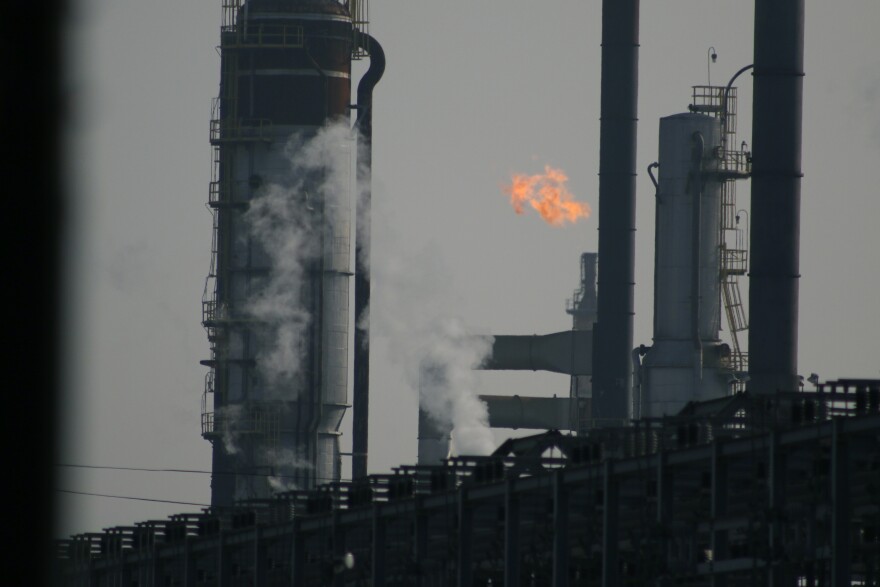This archival content was originally written for and published on KPCC.org. Keep in mind that links and images may no longer work — and references may be outdated.
Exxon ordered to disclose some Torrance Refinery blast documents

Exxon Mobil must turn over some documents it had previously refused to provide to the federal agency investigating a massive explosion at the Torrance Refinery, a federal judge has ordered. However, the ruling lets Exxon withhold other documents concerning a potentially deadly chemical some Torrance residents want banned.
U.S. District Judge Consuelo B. Marshall ruled this week that Exxon need not comply with U.S Chemical Safety Board's subpoena of documents detailing Exxon's use of modified hydrofluoric acid. Those were irrelevant to the investigation of the explosion, Marshall's ruling said.
The dispute stems from the U.S. Chemical Safety Board investigation of an explosion on Feb. 18, 2015 in which a 40-ton piece of debris landed within five feet of a tank filled with thousands of gallons of the chemical, also called MHF. The Safety Board classified the explosion as a near-miss disaster because MHF, if released, could have formed a ground-hugging toxic cloud that could have injured or killed people for miles around.
The decision to allow Exxon to withhold information on MHF was disappointing to several residents and environmentalists who want the chemical banned in California. Right now, just two refineries -- the Torrance Refinery and the Valero Refinery in Wilmington use the chemical to make gasoline.
"Once again, the oil refining and chemical industries are being allowed to hide the truth from the public behind bogus trade secret rights," said Sally Hayati, president of Torrance Refinery Action Alliance.
MHF is now the subject of a South Coast Air Quality Management District inquiry that could result in its phase-out at both refineries over several years.
Exxon, which provided thousands of pages of documents in compliance with the Safety Board's subpoenas, had long refused to hand over many others. In May, the U.S. Department of Justice filed a petition in federal court on the Safety Board's behalf to force Exxon to provide all the documents that were subpoenaed, including many describing Exxon's use of MHF at Torrance Refinery.
Judge Marshall's ruling, if it withstands appeals, would force Exxon to hand over a broad array of documents about the safety measures, maintenance practices and descriptions of the risk the refinery presents to the surrounding community. Those documents mostly concern the specific units of the refinery that failed and caused the explosion.
But the ruling lets Exxon retain documents about the part of the refinery known as the alkylation unit, which uses MHF. The ruling also permits Exxon to withhold documents about a small leak of MHF that occurred in September 2015. Those documents were beyond the scope of the Safety Board's investigation of the February 2015 explosion, Marshall said in the ruling.
The judge rejected Exxon's request that the documents, once provided to the Safety Board, remain confidential. She ruled that the company had not proven that a protective order was necessary.
That ruling opens the door for some of the community groups that have been pushing for an MHF ban to obtain more information about the risk to the community under the federal Freedom of Information Act. However, some of the documents might already be excluded from public disclosure under other provisions that protect confidential commercial information.
The U.S. Attorney's office in Los Angeles declined to be interviewed about the decision. A spokesman from Exxon Mobil did not respond to a request for comment.
"The CSB is encouraged that the [c]ourt’s decision upholds the CSB’s authority to investigate the facts, conditions, and circumstances surrounding major chemical incidents," said Safety Board spokeswoman Hillary Cohen in a written statement. She said the agency had not yet decided whether to appeal to get all the documents it wanted.
